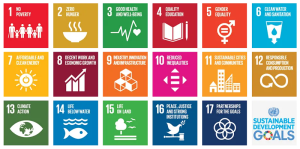Gathering at the SDG Summit from September 18 to 19, 2023, world leaders agreed on Monday, September 18, to urgently step up their efforts to deliver the Sustainable Development Goals (SDGs), our global roadmap out of crises, by 2030.

World leaders made an historic global promise to secure the rights and well-being of everyone on a healthy, thriving planet when they agreed to the 2030 Agenda and the 17 SDGs in 2015. However, at midpoint of SDG implementation, the SDGs are in peril.
Tens of millions have fallen into poverty since 2020. Over 110 million people are forcibly displaced. Inequalities have worsened, strikingly so for women and girls. Many governments are forced to choose between debt payments and investing in healthcare and education. The climate emergency is wreaking havoc on lives and livelihoods. Developing countries and the world’s most vulnerable people continue to bear the brunt of these crises.
“The SDGs aren’t just a list of goals. They carry the hopes, dreams, rights and expectations of people everywhere,” said UN Secretary-General, António Guterres. “Yet today, only 15 per cent of the targets are on track. Many are going in reverse. Instead of leaving no one behind, we risk leaving the SDGs behind.”
The Political Declaration
Leaders adopted a decisive, action-oriented political declaration at the Summit, highlighting their collective commitment to build a sustainable, inclusive and prosperous world by 2030.
With a strong focus on the means of implementation, and in particular, on financing for development, the declaration acknowledges that without a quantum leap in investments to enable just and equitable energy, food, digital transitions, and a transformation in education and robust social protection in developing countries, the goals simply will not be met.
Additionally, the Declaration urges immediate action to deliver an SDG Stimulus proposed by the UN Secretary-General, which calls for a massive increase in financing for the achievement of the SDGs to the tune of $500 billion each year. It also conveys strong support from all countries for a much-needed reform of the international financial architecture to better reflect today’s global economy.
“I am deeply encouraged by the detailed and wide-ranging draft political declaration under consideration here today – especially its commitment to improving developing countries’ access to the fuel required for SDG progress: finance. This can be a game-changer in accelerating SDG progress,” stated the Secretary-General.
Global and National Commitments
Over 100 Countries will present national commitments to SDG Transformation that include priority transitions and areas for investment, setting national benchmarks for reducing poverty and inequalities by 2027 and strengthening institutional frameworks to support SDG progress. In addition to these national commitments, developed countries and other countries who have the capacity, are expected to make individual global commitments drawing on the Secretary-General’s proposal for an SDG Stimulus and broader means of implementation, such as fulfilling ODA commitments, suspending debt payments and agreeing on innovative finance mechanisms.
SDG Action Weekend
The SDGs cannot be delivered by governments alone. The SDG Action Weekend from September 16 to 17 gave an opportunity for over 3,000 people from all sectors of society to outline their commitments to accelerate progress on the SDGs. The SDG Mobilisation Day on Saturday, September 16, saw business, civil society, science, local authorities and young people making meaningful contributions to SDG implementation.
The SDG Acceleration Day on September 17 highlighted UN High-Impact Initiatives that show that transformation is possible and will help to drive momentum for action on the ground in the coming years. The initiatives focus on six major transitions that will drive progress across the SDGs: i) Social Protection; ii) Energy; iii.) Education; iv) Food Systems; v) Digital Transformation; vi) Biodiversity and Nature, underpinned by greater financing and other supports, as well as action to advance gender equality.
